Northeast News
March 4, 2015
KANSAS CITY, Missouri — The Kansas City University of Medicine and Biosciences (KCUMB), the University of Missouri – Kansas City (UMKC) and the University of Kansas (KU) Medical Center have announced a research consortium among the three Kansas City-area institutions. The consortium brings together scientists and resources focused on the research of musculoskeletal disorders and diseases.
According to a press release regarding the announcement, the consortium is the first initiative of its kind in Kansas City and provides opportunities to combine the individual strengths and resources of the three health sciences schools to advance translational research. The goal of this partnership is to build medical research teams that will focus on specific diseases of muscle and bone, accelerating the process of turning discoveries into clinical treatments while also improving research education opportunities for health sciences students.
The consortium will be overseen by an executive committee comprised of Lynda Bonewald, PhD, vice chancellor for translational and clinical research at UMKC; Jeffrey Joyce, PhD, vice president for research at KCUMB; and Richard Barohn, MD, vice chancellor for research at the KU Medical Center. Bonewald will serve as founding director of the consortium, with directorship duties rotating between each of the institutions.
“The consortium builds upon the individual strengths of each institution in basic and clinical research to truly improve the health of the communities we serve,” Joyce said. “It leverages the investments and resources of each institution to maximize the impact on translational research in musculoskeletal diseases.”
This is the first formal agreement for joint research between the three universities’ health sciences schools, but the region can look forward to more collaborative efforts. At a recent panel featuring the deans of these three schools of medicine, they each indicated their strong desire to foster collaboration.
“We have the unprecedented opportunity to tackle diseases of the bone and muscle through the newly formed Kansas City Consortium,” Bonewald said. “The goal of this consortium is to build powerful research teams of basic to clinical investigators from our three institutions to discover new treatments and cures. These research teams will give our students opportunities to work alongside these researchers to understand and optimally treat musculoskeletal disease.”
Wayne Carter, president and chief executive officer of the Kansas City Life Sciences Institute, said in the press release people are more innovative and successful when they solve problems collaboratively than individually. Bruce Dubin, executive vice president for academic affairs provost and dean of the KCUMB College of Osteopathic Medicine, added that in his experience, he finds the level of cooperation between medical schools in other states doesn’t come close to the sense of what they are doing at KCUMB, UMKC and KU.
“This is a collaboration that doesn’t exist anywhere and serves as a role model for the rest of the country,” Dubin said.


















